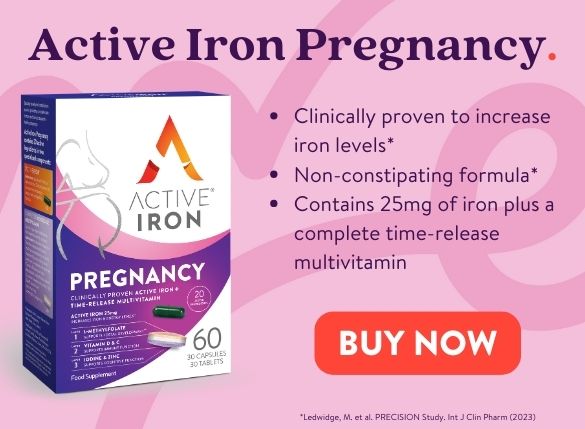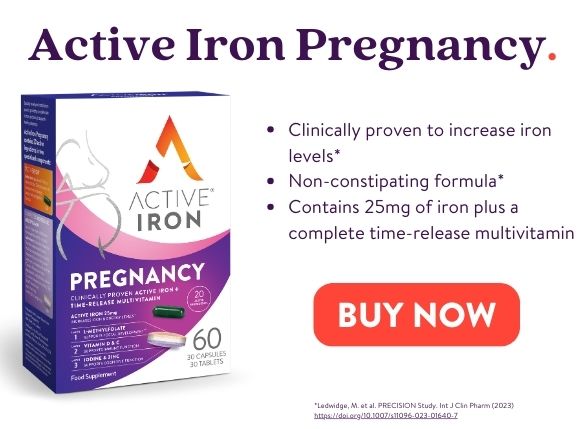Are you pregnant and wondering if it’s OK to take iron supplements? In this guide we’ll answer your questions, and help you understand the role iron plays in pregnancy.
Can you take iron while pregnant?
Pregnancy is a big moment of change in any woman’s life, and getting the right information on what vitamins to take throughout your pregnancy can be confusing.
In this article guide on iron in pregnancy, we will cover everything you need to know about maintaining adequate iron levels throughout your pregnancy. We’ll talk about:provide advice on:
• The safety of taking iron while pregnant
• How to get iron in pregnancy
• The amount of iron a pregnant woman should take
• How much iron a pregnant woman should take
• When iron tablets should be taken in pregnancy
• Side effects associated with iron supplementation
Can you take iron supplements while pregnant?
Iron supplements are perfectly safe to take pre-conception, during pregnancy, and after birth. In fact, many doctors and midwives will recommend iron supplements to their patients during their pregnancy, as the need for iron increases when an individual is pregnant.
Iron is an essential nutrient during pregnancy to support your baby’s developing blood supply, as well as keeping your own levels up.

Can you take iron tablets when pregnant?
Taking iron tablets during your pregnancy is both safe and recommended.
Doctors and midwives will often recommend taking iron supplements as part of your pregnancy vitamin regiment.
We get our iron through food, but during pregnancy, the need for iron increases, and it can be difficult to keep your levels at an adequate amount.
Once a woman’s iron levels have become inadequate during pregnancy, diet alone is insufficient to raise those levels, and in this instance, supplementation is recommended without delay.
How much iron should a pregnant woman take?
During pregnancy, your blood volume increases significantly. Because of this, you need to be getting about 30mg of elemental iron in your diet or through supplements to support healthy growth and development in pregnancy. Active Iron Pregnancy Plus contains 25mg. Some women may be prescribed even higher doses by their doctor if their levels are still inadequate, allowing a further 5mg to come from their diet.
When should iron supplements be taken during pregnancy?
Iron can be taken throughout your entire pregnancy, and is especially important in the first trimester to build up adequate stores in anticipation of the increased blood loss experienced in the second and third trimesters.
As your baby grows, your body is working hard to develop the foetus and placenta, which calls for an extraordinary increase in red blood cell production. If you find that your iron levels are inadequate later in your pregnancy, iron tablets are recommended to rebuild those stores to adequate levels.

Are there any side effects of iron tablets during pregnancy?
Many women complain of gastrointestinal side effects when taking iron tablets, which is why we created Active Iron, the only iron supplement that is clinically proven to increase iron levels whilst avoiding the side effects of iron.
Active Iron causes 6X less gut irritation than normal oral irons. Your body naturally absorbs iron in the upper intestine, but most iron supplements get absorbed in the stomach instead, which causes unpleasant side effects such as nausea, constipation, and black stool. Many high-dose iron products are not well absorbed, it is this unabsorbed iron that can cause gut irritation
This also allows Active Iron to be better absorbed than other iron and is clinically proven to increase iron levels by 94% in six months, compared to other iron supplements.
Conclusion: Can I take iron pills while pregnant?
You absolutely can take iron pills during your pregnancy, and many healthcare professionals will recommend that their patients take iron while pregnant.
It is recommended to begin taking iron tablets in your first trimester, to build up adequate stores of iron in anticipation of increased blood flow in your second and third trimesters.
If you are already further along in your pregnancy, then taking iron tablets can be a great way to rebuild lost iron stores. Many oral irons on the market are notorious for their gastrointestinal side effects, but Active Iron is clinically proven to provide better absorption of iron while being gentle on the stomach, and increases iron levels by 94% in six months.





